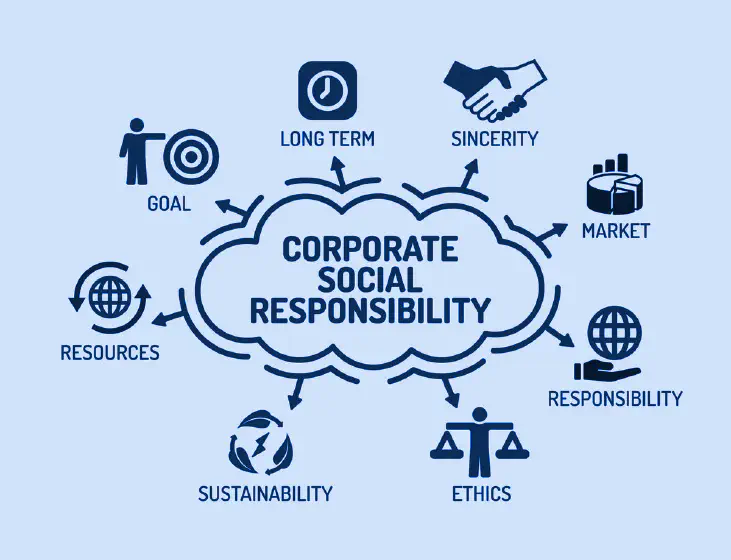At one time, maybe some of you have participated in a social or environmental activity that involved the wider community organized by the cooperation of non-governmental organizations, some corporations, maybe even the government. Maybe you are wondering whether these activities are part of the “advertising” strategy or what?
There is no need to be overly suspicious, maybe you should even be grateful, because this activity might just be part of the Corporate Social Responsibility (CSR). Hmmmm, let’s find out what CSR really is.
In recent years, there has been a growing trend towards corporations taking on social responsibility initiatives in addition to their core business activities. This concept, known as Corporate Social Responsibility (CSR), involves corporations taking proactive measures to address social and environmental issues and create a positive impact in their communities.
What is Corporate Social Responsibility?
CSR can be defined as a corporation’s voluntary actions to improve its impact on society and the environment, beyond what is required by law or regulations. This can include initiatives such as reducing carbon emissions, supporting local charities, and promoting diversity and inclusion in the workplace.
The goal of CSR is to create a sustainable business model that benefits not only the corporate and its shareholders, but also the wider community and the planet. By taking a long-term view and considering the impact of their actions on all stakeholders, corporations can build trust and goodwill with their customers, employees, and the public.
Why is Corporate Social Responsibility Important?

There are several reasons why CSR is important for corporations today. Firstly, consumers are becoming increasingly conscious of the impact of their purchasing decisions on society and the environment. Corporations that demonstrate a commitment to social responsibility can attract and retain customers who value sustainability and ethical business practices.
Secondly, CSR can help corporations build stronger relationships with their employees. By promoting a culture of social responsibility and providing opportunities for employees to get involved in community initiatives, corporations can improve employee engagement and satisfaction.
Finally, CSR can help corporations mitigate risks and enhance their reputation. By proactively addressing social and environmental issues, corporations can avoid negative publicity and potential legal and regulatory problems.
My Insights on Corporate Social Responsibility
I believe that corporations have a responsibility to not only maximize profits, but also to consider the impact of their actions on society and the environment. While CSR initiatives may require additional resources and investment, the long-term benefits can far outweigh the costs.
Furthermore, I believe that CSR should not be viewed as a one-time event or a marketing tactic, but rather as an ongoing commitment to responsible business practices. Corporations should strive to integrate social responsibility into their core business strategy and operations, and constantly evaluate and improve their impact on society and the environment.
In conclusion, corporate social responsibility is an important concept that can benefit both corporations and society as a whole. By taking proactive measures to address social and environmental issues, corporations can build trust and goodwill with their stakeholders, enhance their reputation, and create a positive impact in their communities.
Meeting the Responsibility of Great Power
Corporate Leadership Challenges on CSR
As the saying goes, “with great power comes great responsibility”. This is particularly true for corporations and their leaders when it comes to corporate social responsibility (CSR). While CSR initiatives can have a positive impact on society and the environment, implementing them can be challenging for corporate leaders. We will explore some of the challenges of corporate leadership on CSR and provide some example steps that leaders can take to address those challenges.
The Challenges of Corporate Leadership on CSR
One of the biggest challenges of corporate leadership on CSR is balancing the demands of stakeholders. Corporations must balance the interests of shareholders, customers, employees, and the wider community, all of whom may have different priorities and expectations. Corporations must also balance the need to generate profits with the need to address social and environmental issues.
Another challenge is measuring the impact of CSR initiatives. While corporations may be able to measure the impact of their initiatives on their own operations, it can be difficult to measure the impact of those initiatives on society and the environment as a whole. This can make it difficult to evaluate the effectiveness of CSR initiatives and make data-driven decisions about where to invest resources.
Finally, implementing CSR initiatives can require significant resources and investment, which can be a challenge for corporations, particularly smaller ones. Corporations must balance the costs of implementing CSR initiatives with the potential benefits, and ensure that they are using their resources in the most effective way.
Example Steps for Leaders on CSR
Despite these challenges, there are steps that corporate leaders can take to implement successful CSR initiatives. Here are some examples:
Develop a clear CSR strategy that aligns with the corporation’s values and goals. This should include specific, measurable goals for social and environmental impact, as well as a plan for how to achieve those goals.
Engage with stakeholders to understand their priorities and expectations. This includes customers, employees, local communities, and other key stakeholders. Corporations should listen to feedback and incorporate it into their CSR strategy.
Measure and report on the impact of CSR initiatives. Corporations should develop metrics for measuring the impact of their initiatives on society and the environment, and report on those metrics regularly. This can help to demonstrate the effectiveness of CSR initiatives and build trust with stakeholders.
Collaborate with other corporations, NGOs, and government entities to address social and environmental issues. Corporations can achieve more impact by working together with other organizations that share their goals and values. This can also help to share resources and reduce costs.
Embed CSR into the corporation’s culture and operations. CSR should not be viewed as a separate initiative, but rather as an integral part of the corporation’s overall strategy and operations. This requires leadership commitment, employee engagement, and ongoing evaluation and improvement.
In conclusion, corporate leadership on CSR is a complex and challenging responsibility, but it is also an opportunity to create positive change in the world. By developing a clear CSR strategy, engaging with stakeholders, measuring and reporting on impact, collaborating with others, and embedding CSR into the corporation’s culture and operations, leaders can meet the responsibility of great power and achieve meaningful impact on society and the environment.
Bonus: Examples of CSR events
As inspiration material, here are 10 examples of CSR events that corporations can organize or participate in:
Community service day: A day in which employees volunteer their time and skills to support local community organizations or causes.
Charity fundraiser: A fundraising event that supports a specific charitable organization, such as a walk-a-thon, gala, or auction.
Environmental clean-up: An event in which employees or community members come together to clean up a park, beach, or other natural area.
Diversity and inclusion workshop: A training session or workshop that promotes diversity and inclusion in the workplace and provides tools for employees to become advocates for these principles.
Employee wellness fair: An event that focuses on promoting health and wellness among employees, such as offering free health screenings, fitness classes, and healthy food options.
Sustainable product showcase: An event that highlights the corporation’s eco-friendly products or services and promotes sustainable living.
Career fair for underprivileged youth: An event that provides career guidance and job opportunities for underprivileged youth who may not have access to traditional career resources.
Supply chain sustainability summit: An event that brings together suppliers, partners, and industry experts to discuss sustainable practices and ways to reduce the environmental impact of the supply chain.
Disaster relief fundraiser: An event that raises money to support disaster relief efforts in areas affected by natural disasters, such as hurricanes, floods, or earthquakes.
Educational seminar on social issues: An event that promotes awareness and understanding of social issues, such as poverty, homelessness, or inequality, and provides tools for individuals to take action to address these issues.
These are just a few examples of the many CSR events that corporations can organize or participate in to create positive impact in their communities and the world.

















